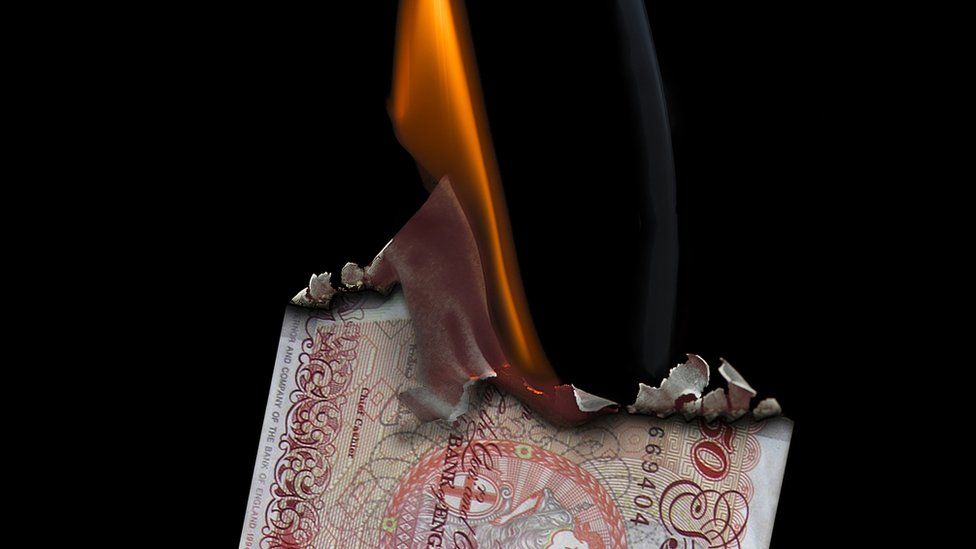How much money does the NHS waste?
- Published

The NHS is the second biggest area of public spending behind welfare. Last year, the Treasury handed over £118bn to the Department of Health in England - that is enough to buy more than 1,200 Paul Pogbas, the most expensive football player on the planet.
But, of course, not all of that goes to the front line. An organisation the size of the NHS - it is the fifth biggest employer in the world and sees a million patients every 36 hours - needs some form of management, administration and regulation.
So how much goes on that sort of stuff? Well, if you look at the £118bn, £17bn was sliced off by the Department of Health with the rest handed down to bosses at NHS England to distribute across the health service.
They gave more than £90bn to hospitals, GPs, mental health services and ambulance trusts.
So what happened to the rest - both that held by NHS England and the Department of Health?
Plenty, you could argue, went to the front line via other routes. Over £3bn went to councils to pay for public health services, such as stop smoking services and sexual health clinics.
Another £3bn went on training doctors and nurses, while £3.7bn was set aside for buildings and facilities maintenance.
The rest went on what you could call central administration and regulation - and that includes £1.4bn set aside for clinical negligence claims, a figure which is on the rise.
All in all, that means over £100bn is funnelled to services and areas that provide care directly to patients.
Why Nick wrote this article:
We asked readers to send BBC health correspondent Nick Triggle questions on the NHS.
Nick chose four questions, and we asked you to select your favourite, which came from dentist Rachael Sullivan.
She asked: "How much of the NHS budget gets spent on administration, settling lawsuits, internal market; what's left for treatment? Is this poor value?"
Her question was prompted by her own experience but also by that of other health professionals.
A hospital nurse I talked to said 37 forms require filling in to admit a patient to hospital," she said.
"And then more electronic data needs entering into the computer.
"That has to be utterly scandalous in terms of wasted manpower."
She went on to ask: "Can't we get rid of ambulance-chasing lawyers who make all healthcare chronically inefficient and more costly as defence against them means forever documenting the obvious as well critically important information?"
Want us to investigate your question? Fill out the form at the bottom of this article.
But, of course, that does not mean every penny is well spent or is not also used to pay for the management and administration of these services.
Research has suggested about 15% of hospital budgets goes on administration - but that includes everything from managers to clerks on wards helping nurses with paper work so they are free to concentrate on care.
That is more than some health systems that do not have an internal market, but much less than the biggest spenders - the US, at 25%, and the Netherlands, at 20%.
So does that mean we can assume money that goes to the front line is well spent? No. In fact, this has been the subject of a recent government-commissioned review by Labour peer Lord Carter.
He identified £5bn of savings he believes hospitals can make by 2020, including through:
- better management of staff (sickness rates can vary widely)
- more intelligent procurement of goods and services
- more efficient use of space (he found one trust that used only a third of its estate for care)
- greater use of cheaper generic medicines
You can also question whether doctors and, to a lesser extent, nurses are always making the right decisions.
Two years ago, the Academy of Medical Royal Colleges looked at the issue of over-treatment.
They estimated £2bn a year was being wasted by giving patients unnecessary X-rays, drugs and treatments.
So where does that leave us? Well there is certainly waste in the system, but in terms of efficiency the NHS is often ranked well in international comparisons.
In fact, a report by the Commonwealth Fund found it was the most cost-effective in the world.
But what these comparisons also show is that the NHS lags behind the very best in terms of outcomes, such as cancer survival.
Why is this? Nigel Edwards, the widely respected chief executive of the Nuffield Trust think tank, says we may be getting the NHS on the "cheap" - compared with other leading European countries, we spend less as a proportion of GDP (a measure of the size of the economy).
His point? By spending more, we would have better buildings and quicker access to technology and treatments, which would improve care and make it more efficient.
Want to shape our coverage? Tell us what question on health and lifestyle you would like us to investigate.
Take a look at some of the other questions you have wanted us to answer:
If you are reading this page on the BBC News app, you will need to visit the mobile version of the BBC website to submit your question.
- Published21 October 2015
- Published11 June 2015
- Published31 May 2015
- Published22 May 2015